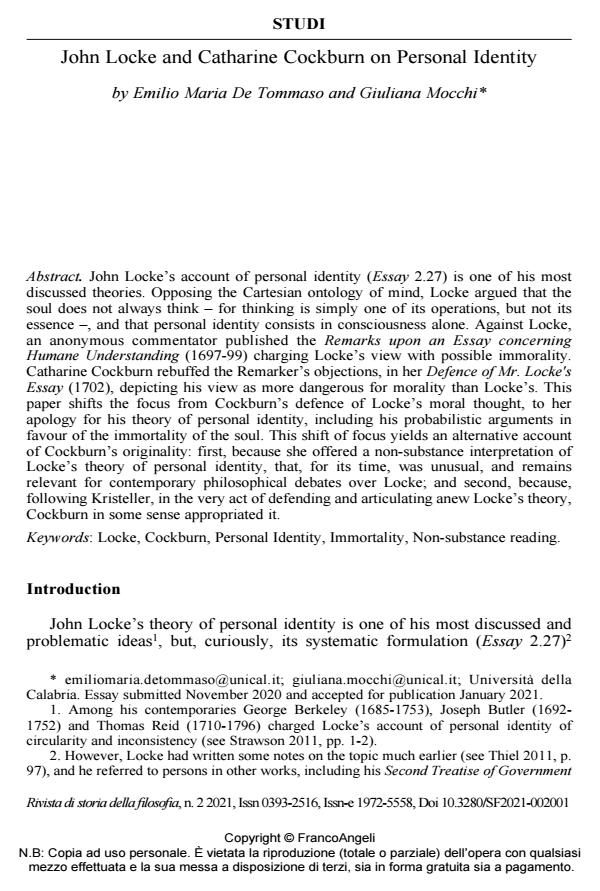John Locke and Catharine Cockburn on Personal Identity
Titolo Rivista RIVISTA DI STORIA DELLA FILOSOFIA
Autori/Curatori Emilio Maria De Tommaso, Giuliana Mocchi
Anno di pubblicazione 2021 Fascicolo 2021/2
Lingua Inglese Numero pagine 16 P. 205-220 Dimensione file 219 KB
DOI 10.3280/SF2021-002001
Il DOI è il codice a barre della proprietà intellettuale: per saperne di più
clicca qui
Qui sotto puoi vedere in anteprima la prima pagina di questo articolo.
Se questo articolo ti interessa, lo puoi acquistare (e scaricare in formato pdf) seguendo le facili indicazioni per acquistare il download credit. Acquista Download Credits per scaricare questo Articolo in formato PDF

FrancoAngeli è membro della Publishers International Linking Association, Inc (PILA)associazione indipendente e non profit per facilitare (attraverso i servizi tecnologici implementati da CrossRef.org) l’accesso degli studiosi ai contenuti digitali nelle pubblicazioni professionali e scientifiche
John Locke’s account of personal identity (Essay 2.27) is one of his most discussed theories. Opposing the Cartesian ontology of mind, Locke argued that the soul does not always think - for thinking is simply one of its operations, but not its essence -, and that personal identity consists in consciousness alone. Against Locke, an anonymous commentator published the Remarks upon an Essay concerning Humane Understanding (1697-99) charging Locke’s view with possible immorality. Catharine Cockburn rebuffed the Remarker’s objections, in her Defence of Mr. Locke's Essay (1702), depicting his view as more dangerous for morality than Locke’s. This paper shifts the focus from Cockburn’s defence of Locke’s moral thought, to her apology for his theory of personal identity, including his probabilistic arguments in favour of the immortality of the soul. This shift of focus yields an alternative account of Cockburn’s originality: first, because she offered a non-substance interpretation of Locke’s theory of personal identity, that, for its time, was unusual, and remains relevant for contemporary philosophical debates over Locke; and second, because, following Kristeller, in the very act of defending and articulating anew Locke’s theory, Cockburn in some sense appropriated it.
Parole chiave:Locke, Cockburn, Personal Identity, Immortality, Non-substance reading.
-
On personal identity and space: some remarks on Ruth Boeker’s
Catharine Trotter Cockburn
Emilio Maria De Tommaso, in British Journal for the History of Philosophy /2025 pp.200
DOI: 10.1080/09608788.2024.2304195
Emilio Maria De Tommaso, Giuliana Mocchi, John Locke and Catharine Cockburn on Personal Identity in "RIVISTA DI STORIA DELLA FILOSOFIA" 2/2021, pp 205-220, DOI: 10.3280/SF2021-002001